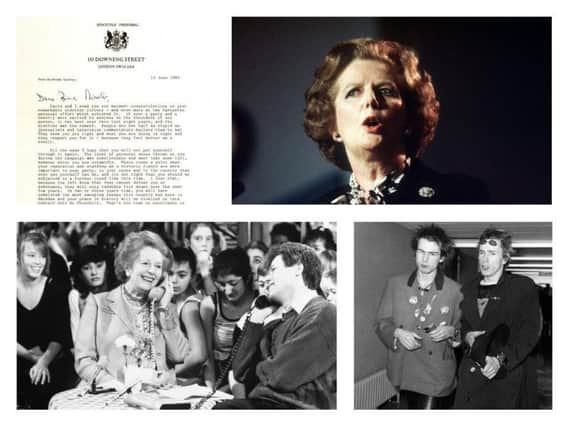Margaret Thatcher was briefed on Sex Pistols for Smash Hits interview - to lift public image with young people


The prime minister was urged to show she was "confident and relaxed" while navigating questions on contemporary music and her personal tastes in a bid to appeal to the youth population, newly-released private papers reveal.
Officials felt it necessary to advise Lady Thatcher on the songs topping the charts and the earlier popularity of punk, which was described as a "very basic musical style featuring a strange bunch of anti-establishment acts".
Advertisement
Hide AdAdvertisement
Hide AdPreparations for the prime minister's March 1987 encounter with Tom Hibbert, deputy editor of Smash Hits, have come to light in the latest release of her personal files.
The Downing Street press office briefing stated: "You may not enjoy this interview.
"Mr Hibbert may ask superficial questions which betray a lack of understanding.
"The challenge of the interview will be for you to demonstrate that just because you are not part of the pop scene, you are still in touch with youngsters and understand their needs."
Advertisement
Hide AdAdvertisement
Hide AdReferencing Lady Thatcher's earlier appearance on children's TV show Saturday Superstore, it went on: "The important thing is to show you are confident and relaxed.
"The way you handled the Superstore appearance is still the subject of praise from youngsters."
A history of punk - at its most vocal during the previous Labour Government - was attached to the note, hinting at the possible challenges posed by the Smash Hits interview.
It read: "The 'PUNK' era which hit the music world between 1976-1978 was a very basic musical style featuring a strange bunch of anti-establishment acts, most famous of which were THE SEX PISTOLS with songs such as God Save The Queen and Anarchy In The UK.
Advertisement
Hide AdAdvertisement
Hide Ad"Other PUNK acts such as THE CLASH and THE DAMNED were popular for a while but when the SEX PISTOLS split up in 1978 the style died out, to be replaced by the current technological musical era featuring computers, synthesizers and videos."
Chris Collins, historian of the Margaret Thatcher Foundation, said the prime minister would have been "well aware" of The Sex Pistols given the "controversy" they stoked in the late 1970s.
He said: "When she was leader of the opposition, she was much more aware of what was in the papers, on TV and so on. She had more time to absorb the stories.
"She will have known about them. She would not necessarily have wanted to be reminded about them."
Advertisement
Hide AdAdvertisement
Hide AdHe added: "I think she was fairly well clued up. Number 10 probably prudently estimated her knowledge of these things as zero, and they wouldn't therefore get it wrong."
The prime minister's music knowledge was further tested during a visit to Jamaica in July 1987, when she addressed a lunch with Prime Minister Edward Seaga, the papers reveal.
Private Secretary Charles Powell, who mentioned Bob Marley's Get Up, Stand Up in his draft speech, wrote to Lady Thatcher: "You will see that I have made references to Jamaican reggae music and modern Jamaican poetry, with which you may well not be entirely familiar!
"But the Jamaicans are very proud of them and a reference in the speech could go down very well."
Advertisement
Hide AdAdvertisement
Hide AdHe attached the lyrics to Marley's popular song to give the prime minister further clarity.
The Margaret Thatcher Archive Trust is gradually overseeing the release of her private files through the Churchill Archive Centre at Cambridge University.
Members of the public can browse the archive by visiting www.margaretthatcher.org